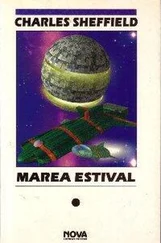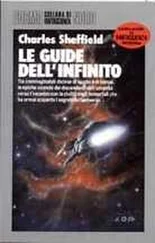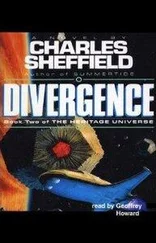Now he felt like the White Rabbit, scurrying along the endless warren of corridors and tunnels leading to the Puzzle Network’s Command Center. He was late, he was late, and it totally fit his ideas of Puzzle Network members that they had chosen a site on Ganymede that could be found only by negotiating a labyrinth. It had been easier to reach the Bat Cave on Pandora. One thing was certain, there must be an alternate route to this destination. The tunnels were in places so narrow that Bat would have to be greased and fired from a cannon to pass through them.
He was at least half an hour late. He had tried to call ahead on his wrist unit, and typical of Bat there had been no answer. Alex arrived at what should be the final door, hurried through, and found himself in a narrow deserted corridor. The floor was covered by a thick sound-deadening carpet. This was the place, it had to be because it fit Bat’s description — but where was Bat? Alex saw a dozen blue doors, every one closed.
That was all right. No one in his right mind would be here at this hour. That left Bat. Alex went along, banging on each door as he came to it until he heard a deep-voiced, “Yo? Enter.”
Alex’s first impression was of an unlit empty room. Bat, swaddled in black clothing and with a black hood around his head, formed a mound of darkness on a padded seat like the one he had occupied in the Bat Cave.
Alex decided to beat Bat to it. “I’m very late. I’m sorry, but there were last minute changes.”
“The time was not wasted.” Bat held out a hand. “The results, if you please. I assume that you have them?”
“I do, but I’m afraid that you will be disappointed. Bengt Suomi’s team performed two hundred and eighty-seven distinct tests on the nodules taken from Sebastian Birch’s body.” Alex gave Bat the data cube and the sheaf of papers. “I gather you’ve been over many of the early results already with Bengt Suomi. He found only one thing in these latest batch of tests that qualifies in his mind as inexplicable. He doubts that it is significant.”
The grunt could have been anything, disappointment or disagreement. Bat said only, “A judgment as to significance depends on what a person hopes or expects to find. I beg your indulgence while I examine these results in detail.”
Alex glanced at his watch. Bat might function well without sleep, but Alex didn’t. The discussions of predictive models went on and on, every day, and Mischa Glaub was a poor sleeper. He tended to call meetings at an early hour when he was in his worst mood and other people were groggy from low blood sugar and lack of caffeine. He admitted — even boasted — that this gave him a psychological advantage. Glaub had another session scheduled for tomorrow morning, which Alex and Kate were obliged to attend.
Alex said, “Let me tell you about the one thing they found that Bengt Suomi considers new and peculiar. It will save time.”
Bat raised a magisterial arm. “Just as likely, it will lead me to ignore other relevant information. Time spent in study is not wasted.” He reached forward and inserted the data cube. “They also serve who only stand and wait. I say again, please indulge me.”
Alex glanced around him. Bat’s oversized seat took up half the cubicle. The rest was displays, desk, control console, food stand, and a portable stove. The room offered no space for a second chair, in the unlikely event that Bat would have tolerated one.
Wait, maybe, but stand, no.
Alex settled on the floor, back against a wall and legs stretched out in front of him. From where he was sitting Bat rose up as solid and steady as a black mountain. Occasionally a sheet of paper was discarded from the sheaf and fluttered to the floor. Occasionally Alex saw the whites of Bat’s eyes, prominent in the coal-black face as they glanced from page to display and back.
Ten minutes passed, and the floor was littered with discarded sheets. Alex moved to a more comfortable position. As he did so he heard a grunt — concern, surprise? He looked up. Bat’s eyes had closed.
It was far into the night, but surely the man couldn’t have fallen asleep? Alex drew his legs in close to his body. He was starting to stand up when he heard a sound outside. The cubicle door opened. Its edge gave him a sharp blow on the right knee and the young woman who entered almost fell over him.
Alex scrambled to his feet and they stood staring at each other.
“Who—” the woman said.
“I have it!” The words that interrupted her came from Bat. He had emerged from his apparent stupor and was suddenly energized. “Bengt Suomi is right. It is curious indeed, and it provides the question if not the answer.”
Alex looked at the woman and said, “I’m Alex Ligon.” She said, “Milly Wu.”
Bat waved his arms at both of them. “No time for that now. This has enormous potential importance.”
The woman said, “What about work on the SETI signal?” and Alex knew why her name sounded familiar.
“For the moment that is superseded.” Bat turned to Alex. “Even now, we must be thorough. I am ready to hear a summary of what the Ligon team considered important in their tests.”
Alex hesitated and glanced at Milly Wu. She shook her head and said, “I don’t understand one word of this. You might as well go ahead.”
Alex considered his answer. Bat was a devil for precision. “They didn’t say they considered that anything was important. They reported that one test gave unusual results.”
“Exactly. An excellent answer. Continue.”
“Ninety-four tests involved the chemical properties of the spherical nodules.”
“A waste of time and effort. Any salient results would surely involve the nodules’ structure, which would be destroyed by chemical tests.”
“Bengt Suomi took very seriously your request that they supplement your list with suggestions of their own. You asked that the team perform as complete a range of tests as possible.”
Bat bowed his head. “I did indeed, and I stand corrected. Bengt Suomi was right to proceed as he did. Continue.”
“Suomi happened to agree with your conclusion — after he saw the results. The chemical tests gave nothing. Then there were the structural microscopic tests, concentrated on geometry and mechanical properties rather than physical or chemical ones. They confirmed that although the nodules appear superficially as perfect spheres, they have a distinctive microstructure. Each one contains tunnels running radially in toward the center. The tunnels are minute, though wide enough to permit the passage of gas molecules. The team could not imagine any physical effect that might depend on such a structure. Bengt Suomi describes that result as interesting, but not informative.”
“An admirably cautious statement.”
“The remaining tests involve physics. The nodules are stable over a wide range of temperatures, pressures, and fields. Radiation and particle bombardment affect them little, except for lattice dislocation effects at high energy levels. Electric and magnetic influences appear unimportant, even with intense fields. There was just one test result that no one could explain. The nodules act as a catalyst in inducing phase transitions of certain gases.”
Bat was nodding. “That is indeed the anomalous test result. Phase transitions, moreover, for gases which do not exist in free form within the human body.”
“Apparently. Suomi found that the catalytic effect was the strongest — the phase transition is almost instantaneous — for free hydrogen. The effect weakens rapidly for heavier gases.” Alex was tempted to add, all this effort, and you’re saying you agree exactly with Bengt Suomi’s conclusions?
But Bat was not looking at Alex or at Milly Wu. He was staring at the display, which showed a magnified view of one spherical nodule. The dark pupils of his eyes had dilated against their luminous whites. He said, very slowly, “So we have the results I requested, and they prompt but do not answer the key question: Why would anyone place such anomalous structures inside the body of Sebastian Birch — a place where those structures are unable to exercise the only effect of which they seem capable?”
Читать дальше












